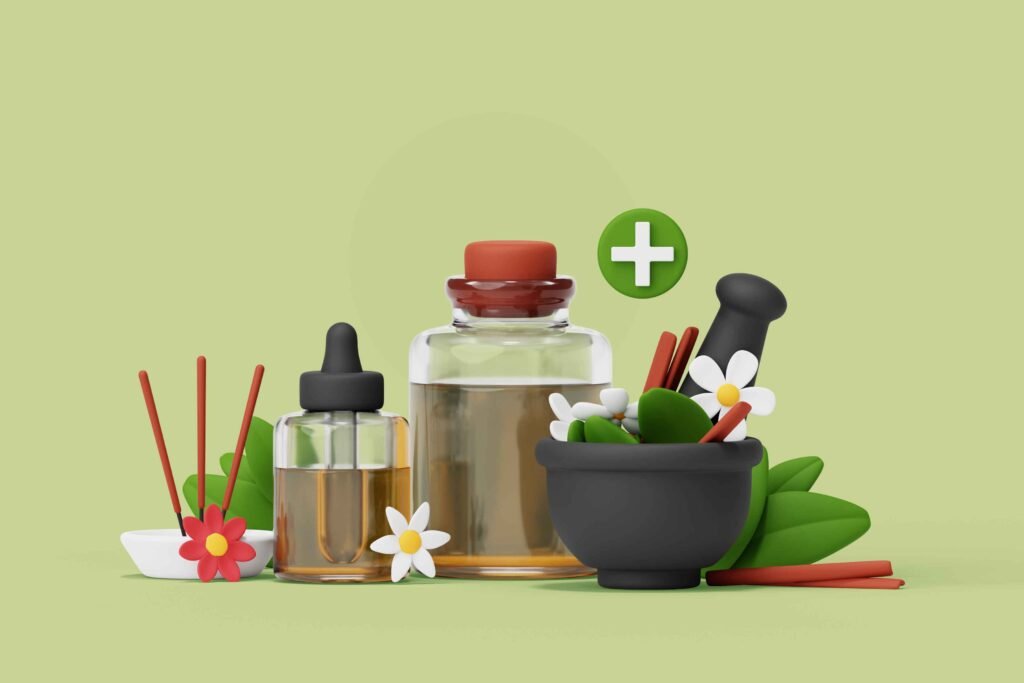
Herbal remedies have been around for thousands of years, used across different cultures to treat common ailments naturally. Today, people are increasingly interested in turning away from chemicals and towards nature’s pharmacy. But, when it comes to herbal treatments, what really works and what doesn’t? Not all herbs are created equal, and some are more effective than others. This post dives deep into the evidence-based effectiveness of some popular herbal remedies.
Why Herbal Remedies?
The shift towards natural remedies has gained popularity for many reasons. Herbal treatments often come with fewer side effects compared to their pharmaceutical counterparts, and many people believe that natural equals better. Whether it’s reducing inflammation, easing a sore throat, or boosting immunity, herbs offer a natural alternative to mainstream medicine.
In this post, we will explore eight of the most popular herbal remedies and determine which of them truly work for common ailments. Let’s start with the golden spice that everyone’s talking about—turmeric.
1. Turmeric: The Anti-Inflammatory Hero 🌿✨
What It’s Used For:
Turmeric, particularly its active ingredient curcumin, has been used to combat inflammation and pain. Turmeric is a bright yellow spice commonly used in Indian cuisine, but it’s more than just a flavor enhancer. It contains compounds with powerful medicinal properties, especially curcumin, which is known for its anti-inflammatory effects.
How It Works:
Curcumin is believed to inhibit inflammation by blocking inflammatory molecules called cytokines. For those suffering from arthritis, turmeric could provide pain relief similar to non-steroidal anti-inflammatory drugs (NSAIDs) like ibuprofen. Studies suggest that curcumin may also help reduce cholesterol and triglyceride levels, improve symptoms of rheumatoid arthritis, and even alleviate symptoms related to irritable bowel syndrome (IBS).
Does It Work?
Turmeric does work to an extent, but it’s best used as a complementary therapy. It can be a valuable addition to your routine, especially if you’re looking for a natural way to manage pain and inflammation. The best part is that turmeric is generally safe, but it’s always advisable to stick to recommended doses—excessive consumption may cause digestive issues.
Pro tip: For better absorption, mix turmeric with black pepper. Piperine, a component in black pepper, enhances the absorption of curcumin by 2000%.
Bottom Line:
Turmeric works, but make sure you consult your doctor, especially if you’re taking medications like blood thinners or need to undergo chemotherapy.
2. Ginger: The Go-To Remedy for Nausea and Digestive Discomfort 🤢🍵
What It’s Used For:
Ginger is best known for its ability to combat nausea and aid digestion. It’s particularly effective for morning sickness during pregnancy, motion sickness, and nausea from chemotherapy.
How It Works:
The active components in ginger, like gingerol and shogaol, help regulate gastrointestinal motility and suppress vomiting. You can use ginger fresh, dried, powdered, or in tea. Studies show that taking even a small dose (1-1.5 grams) of ginger can significantly reduce nausea.
Does It Work?
Ginger is a highly effective herbal remedy for nausea, with studies backing its positive effects. Moreover, it is safe for most people, though some might experience mild side effects like heartburn.
Fun Fact: The use of ginger for digestive issues dates back more than 2,500 years, particularly in Traditional Chinese Medicine (TCM).
Bottom Line:
Ginger is an effective and safe choice for dealing with digestive problems and nausea.
3. Echinacea: Immune Booster or Myth? 🦠💪
What It’s Used For:
Echinacea is often used to boost immunity and prevent colds. This North American native flower has been at the center of immune health discussions for years, but does it really work?
How It Works:
Echinacea is believed to increase the number of white blood cells in the body, which play a key role in fighting infections. The root and upper parts of the plant are used to make tea, tablets, and extracts.
Does It Work?
The evidence on echinacea is mixed. While some studies have found that it can reduce the severity and duration of cold symptoms, others have found no significant benefit. The inconsistency in research could be due to the variations in species and preparation methods used in different studies.
Bottom Line:
Echinacea might work for some people, but don’t bank on it as a sure-shot prevention or cure for colds. It’s most effective when taken at the first sign of a cold.
4. Garlic: Nature’s Heart Health Protector ❤️🧄
What It’s Used For:
Garlic is touted for its ability to improve heart health. It has been used in folk medicine for centuries to reduce blood pressure, lower cholesterol, and maintain cardiovascular health.
How It Works:
The magic in garlic lies in allicin, a sulfur compound that forms when garlic is chopped or crushed. This compound has been shown to help lower high blood pressure, reduce cholesterol, and even act as a blood thinner.
Does It Work?
Regular consumption of garlic appears to have a modest effect in reducing blood pressure and cholesterol, especially in individuals with hypertension. Fresh garlic, rather than processed garlic, provides the best results.
Tip: Let garlic sit after chopping for 10 minutes before cooking to maximize the formation of allicin.
Bottom Line:
Garlic works for heart health but should be combined with lifestyle changes and conventional treatments for optimal results.
5. Chamomile: Your Herbal Relaxation Aid 🌼😴
What It’s Used For:
Chamomile is well-known for its calming effects and is used to alleviate anxiety and improve sleep quality.
How It Works:
The active compound in chamomile, apigenin, binds to receptors in the brain, promoting relaxation and improving sleep. Chamomile tea is a popular bedtime beverage, and for good reason—it acts as a gentle sleep aid without the side effects associated with pharmaceuticals.
Does It Work?
Yes, chamomile can significantly improve sleep quality, particularly for people suffering from mild insomnia or anxiety. It is a gentle and effective option for promoting sleep and relaxation.
Recommendation: A cup of chamomile tea 30 minutes before bedtime can help calm your nerves and prepare your body for restful sleep.
Bottom Line:
Chamomile works, making it an excellent natural solution for reducing anxiety and improving sleep.
6. Peppermint: A Stomach Soother 🍃💨
What It’s Used For:
Peppermint oil is often used to relieve digestive discomfort such as irritable bowel syndrome (IBS), bloating, and gas.
How It Works:
The menthol in peppermint oil helps relax the muscles of the gastrointestinal tract, which eases symptoms of IBS and improves digestion. Enteric-coated peppermint oil capsules have been found to significantly reduce symptoms like bloating and abdominal pain.
Does It Work?
Peppermint oil is effective for digestive issues and can be particularly helpful for IBS. However, those prone to acid reflux should be cautious as peppermint may worsen symptoms.
Warning: Avoid using peppermint oil if you have gastroesophageal reflux disease (GERD), as it may aggravate symptoms.
Bottom Line:
Peppermint oil is a reliable remedy for digestive problems, but it’s best suited for people without reflux issues.
7. St. John’s Wort: Mood Enhancer or Risky Business? 😔🌼
What It’s Used For:
St. John’s Wort is commonly used for mild to moderate depression. It’s believed to work similarly to antidepressants by increasing levels of serotonin in the brain.
How It Works:
St. John’s Wort contains hypericin, which is thought to inhibit the reuptake of serotonin and dopamine, two neurotransmitters linked to mood regulation.
Does It Work?
Some studies suggest that St. John’s Wort may be as effective as conventional antidepressants for mild depression, but it also comes with a risk of interactions. It can interfere with birth control, blood thinners, and many other medications.
Important Note: Consult your healthcare provider before using St. John’s Wort, especially if you’re on any medication.
Bottom Line:
St. John’s Wort might work for mild depression but should be used under professional supervision due to its interactions.
8. Cold Remedies That Work and Don’t Work 🤧❄️
What Works for Colds:
- Stay Hydrated: Water, juice, and clear broth can help loosen congestion.
- Rest: Give your body the chance to heal.
- Warm Liquids: Herbal teasContinuing from where we left off, let’s delve deeper into what actually works and what doesn’t for cold symptoms.
Effective Cold Remedies:
- Hydration is Key
Drinking plenty of fluids like water, warm lemon water with honey, or clear broth helps keep the body hydrated, which can loosen congestion and help you recover faster. Avoid alcohol and caffeine, which may dehydrate you further. - Get Plenty of Rest
Resting allows your body to conserve energy and focus on fighting off the virus. There’s no miracle herb that will make a cold disappear overnight, but rest can speed up recovery. - Soothe a Sore Throat
A saltwater gargle is a simple and effective way to temporarily relieve a sore throat. Mix 1/4 to 1/2 teaspoon of salt in an 8-ounce glass of warm water and gargle several times a day. - Use a Humidifier
Adding moisture to the air with a cool mist vaporizer or humidifier can help ease congestion. Be sure to clean the unit regularly to prevent the growth of mold and bacteria. - Sip Warm Liquids
Drinking warm herbal teas or chicken soup can help increase mucus flow and ease congestion. Chicken soup, in particular, has anti-inflammatory properties that may reduce cold symptoms.
What Doesn’t Work for Colds:
- Antibiotics are Ineffective
Colds are caused by viruses, not bacteria, so antibiotics are of no help in treating them. Misuse of antibiotics can lead to antibiotic resistance, a growing global concern. - Over-the-Counter Cold Medications in Young Children
OTC cold medications might seem like an easy solution for children, but they can have severe side effects and should be avoided in children under six. Always consult a doctor before administering any medication to young children.
Cold Remedies with Conflicting Evidence
- Vitamin C
The jury is still out on vitamin C. It seems to shorten the duration of colds only in those at high risk of exposure. Regular supplementation is unlikely to prevent colds altogether. - Echinacea
Echinacea has mixed reviews, with some people experiencing reduced symptoms while others see no improvement. It may provide benefit if taken at the first sign of a cold, but it’s not a guarantee.
Final Thoughts
Herbal remedies offer a natural approach to managing and treating common ailments. While some of these remedies are supported by scientific evidence, others have mixed or limited results. Turmeric, ginger, garlic, chamomile, and peppermint show the most promise for their respective uses, but it’s important to approach their use with informed caution. Echinacea and St. John’s Wort have potential benefits but require careful consideration, especially if other medications are involved.
It’s always a good idea to consult your healthcare provider before starting any new herbal remedy, especially if you are pregnant, breastfeeding, or taking other medications. Nature offers many powerful tools for wellness, but safety is key in using them effectively.
Takeaway: Herbal remedies can complement modern medicine effectively, but they should not be seen as replacements. Consulting with a healthcare professional can help you decide what’s best for your health journey.



